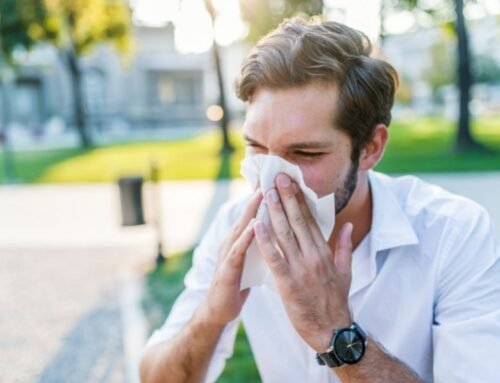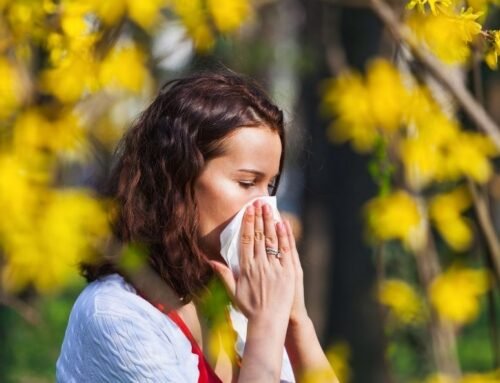The most common symptoms of allergic rhinitis in adults are itching in the nose, discharge, congestion, and repeated sneezing. Apart from that, there are many accompanying symptoms.
What Should You Do If You Have Symptoms of Allergic Rhinitis?
Adult patients with symptoms of allergic rhinitis should go to an allergist. If you have symptoms of allergic rhinitis, it should be examined and allergy tests should be done to make a diagnosis.
Allergic rhinitis, which is one of the allergic diseases, is effective on many organs as in other diseases. When complaints of nasal discharge, congestion, sneezing begin, ENT physicians are often visited, but the disease is not limited to the nose and throat. When the eyes are itchy and watery, we go to ophthalmologists, but the allergy will not be limited to our eyes. When shortness of breath develops, wheezing is followed by the diagnosis of asthma, by chest diseases or by dermatology for the accompanying eczema atopic dermatitis complaints. That is why it is very important for allergic diseases to be diagnosed and treated by allergy specialists.
As with all allergic diseases, if the correct diagnosis is made, the symptoms of allergic rhinitis can be controlled with the right medications and it is not necessary to go to many physicians. Allergists find out which allergens they are allergic to and how to treat them, and whether allergy vaccination is needed.
If you have symptoms of allergic rhinitis, it is useful to see an allergist.
-Adult Allergy Specialists are doctors who have received special training on allergic rhinitis and allergic diseases seen after the age of 18 and are also Internal Diseases Specialists who have received an Allergy Diseases Specialist diploma.
-The only specialist trained in the performance and evaluation of allergy testing in adults is an adult allergy specialist.
– The allergy test should be performed, evaluated, and the decision of whether allergy vaccine is required should be taken by adult allergy experts and should plan its treatment. Otherwise, it may cause a long-lasting misdiagnosis and treatment.
How Should I Prepare When Visiting a Doctor If You Have Allergic Rhinitis Symptoms?
If you have complaints of nasal itching, congestion and sneezing, it is necessary to reveal whether these complaints are allergic or not. If you have decided to go to the allergy doctor for the diagnosis of your complaints compatible with allergic rhinitis, we will try to give information about how to prepare.
Should I See an Allergist for Allergic Rhinitis?
Allergy specialists are doctors who are very experienced in the diagnosis of allergic rhinitis along with other allergic diseases and are also internal diseases specialists who receive special training in this field. For this reason, it is beneficial to go to an allergist if possible.
When you go to allergy specialists, you will be diagnosed whether your complaints are allergic or if there is a relationship with other diseases. For example, these complaints of some of the patients with nasal obstruction may be due to the underactive thyroid gland (hypothyroidism). The importance of the need to treat thyroid-related disease is to be explained. Allergists are also internal medicine specialists.
Bring your tests for allergic rhinitis while going to the doctor!
When you go to the allergist for the symptom of allergic rhinitis, it is also useful to take your x-rays, which have been performed before. Because re-conducting the previous examinations is prevented.
For Allergic Rhinitis, You Should Stop Some Medications Before Going To The Doctor!
If you have decided to go to a doctor for allergic rhinitis, and if possible, you should stop using allergy medications, cough and cold medicines, some antidepressants, especially antihistamines. Allergy test may be required for the diagnosis of allergic rhinitis, and unfortunately these drugs will affect the results of the allergy test, and these drugs should be discontinued at least 1 week before by asking the doctor. Nasal sprays and breath-opening sprays do not affect the allergy test. It does not need to be stopped. In addition, you do not need to stop the blood pressure medications, thyroid or diabetes medications used by the patient for your other diseases. If you are using antibiotics, you do not need to stop them.
No Need To Be Hungry!
There is usually no need to starve for the tests required for the diagnosis of allergic rhinitis. For this reason, it is beneficial to come by having breakfast.
How is Allergic Rhinitis Diagnosed?
Allergic rhinitis in adults is a serious health problem that affects both the health and social life of people and disrupts their quality of life. Allergic rhinitis is not only in the form of nasal discharge, itching, congestion and sneezing, but unfortunately it brings other health problems in the future. Adults with symptoms of allergic rhinitis need allergy tests to be diagnosed with allergic rhinitis. We tried to answer what should be done for the diagnosis of allergic rhinitis and how the tests will be done for you.
What Should be Looked During Examination for Allergic Rhinitis Diagnosis?
For the diagnosis of allergic rhinitis in adults, after a careful history is taken, the patient should be examined for other diseases that may be accompanied by a general examination. Since there may be asthma along with allergic rhinitis, the upper respiratory tract should be checked for respiratory system examination, since ear discharge may be sinusitis and pharyngitis. A careful nasal examination should be done. It should also be examined in terms of eczema, which may accompany allergic rhinitis.
What Tests Are Used in the Diagnosis of Allergic Rhinitis in Adults?
Some tests are done to diagnose Allergic Rhinitis in adults. The most important of these tests are skin prick tests. Allergy tests can be performed at any age, but for the diagnosis of allergic rhinitis, it can usually be done in all adults after 2-3 years of age. For allergy testing, skin tests, which we call skin prick test, are preferred, but sometimes, blood allergy tests can be performed in patients who cannot be tested. Skin tests give more accurate results. Apart from allergy testing, snot analysis, blood test and respiratory function tests may be required in allergic asthma suspects.
Diagnosis of Allergic Rhinitis in Adults Requires an Experience !!!
Adults with allergic rhinitis complaints are not diagnosed with just one test. Diagnosis is a condition that should be evaluated as a whole. Symptoms of allergic rhinitis should be evaluated together with history and allergy tests and other tests and a definite diagnosis should be made. If there is incompatibility in the skin tests performed with the patient’s complaints, it is necessary to benefit from other tests and examinations. The allergens used in the diagnosis of allergic rhinitis and the positive response seen in skin tests against these allergens are very important for the long-lasting treatment of the patient. Experience and education are very important in making this diagnosis and planning treatment.
Which Diseases Does Allergic Rhinitis Confused With?
Allergic rhinitis presents with runny nose, itching, congestion and sneezing, but these complaints are not only symptoms of allergic rhinitis. There are many reasons for non-allergic rhinitis, so it is necessary to make examinations by allergists to determine whether they are allergic or not.
Infections in non-allergic rhinitis have an important place. In rhinitis due to infections, there is a feeling of pain/pressure on the face or a decrease in the sense of smell accompanying nasal congestion or discharge. The term infectious rhinosinusitis is preferred instead of infectious rhinitis as it often accompanies sinusitis.
Idiopathic rhinitis (vasomotor rhinitis) can be differentiated from allergic rhinitis because of its late onset, nasal congestion and postnasal discharge. Persistence of symptoms throughout the year, increasing complaints with irritants and climate changes, unlike respiratory allergens, also helps this distinction. It can also be distinguished from allergic rhinitis by the absence of a family history or accompanying allergic symptoms such as conjunctivitis. Complaints arise with non-specific triggers such as heat-cold change, cigarette smoke, chemicals, and pungent odors, especially due to nervous hypersensitivity rather than allergic sensitivity. There is a marked disorder in the thermoregulatory systems of these people. Allergy skin tests are negative.
Occupational Rhinitis develops due to conditions caused by chemicals or allergens in a particular work environment. Symptoms that occur in the workplace may also be due to increased severity of pre-existing rhinitis.
Hormonal Rhinitis menstrual cycle
Hormonal Rhinitis may cause nasal complaints in some endocrinological diseases such as menstrual cycle, puberty, pregnancy and hypothyroidism. Nasal congestion that developed in the last six weeks (or more) of pregnancy without gestational rhinitis, respiratory tract infection or allergic cause and resolved within two weeks following delivery was attributed. It should not be forgotten that hormonal disorders such as hypothyroidism cause rhinitis.
Drug-related painkillers and decongestants can cause rhinitis complaints.
Symptoms of rhinitis can also occur with emotional rhinitis, atrophic rhinitis, or due to physical and chemical substances.
In all such cases, nasal discharge can manifest itself with complaints such as congestion, sneezing, itching. Therefore, it is important to reveal the allergic rhinitis with allergy tests for treatment.
Can Allergic Rhinitis Be Treated?
After the tests are made for the diagnosis of allergic rhinitis and other accompanying diseases, it is extremely important to protect the allergens that cause allergic rhinitis complaints or to treat the complaints that occur. Patients who are evaluated by allergists are allowed to live without allergic rhinitis complaints.
What Should Be Done for the Treatment of Allergic Rhinitis in Adults?
As in all allergic diseases, there are many factors in the treatment of allergic rhinitis including prevention treatment, drug therapy, allergy vaccine, complementary therapy and education.
What is the Prevention Treatment in Allergic Rhinitis Treatment?
Since it occurs after contact with allergens that we are sensitive to in allergic diseases, the prevention treatment of allergic rhinitis is carried out for the cause of the complaints. If we are sensitive to any allergen, protection is made against that allergen. For example, if there is a house dust mite allergy that we encounter most frequently, protection measures against house dust are taken. Measures should be taken to reduce house dust in our lives. In order to reduce the areas where house dust will live, the sheets should be washed at 60 degrees and the carpets should be removed in the room where you sleep. Household items that can collect dust should be reduced. If allergic to animal epithelium such as cats and dogs, contact with these animals should be reduced. After the allergens responsible for allergic rhinitis are detected by allergy tests, preventive measures for them cause less allergic rhinitis complaints and less medication use is provided.
Adults with allergic rhinitis have very sensitive noses and therefore an excessive response to many chemicals. Especially the detergents, deodorants and perfumes that we use in our daily lives can cause sneezing, nasal itching. It should be said that adult patients with allergic rhinitis should use cleaning materials such as scentless detergents and be careful when using perfumes with sharp scents.
Drug Therapy in Allergic Rhinitis Treatment
Allergic rhinitis in adults is a serious health problem that affects both the health and social life of people and disrupts their quality of life. Complaints such as, nasal itching, congestion and sneezing should be prevented. Drugs that improve allergic rhinitis symptoms and medications are used in the drug treatment of allergic rhinitis. Most of the medications we will use for allergic rhinitis are to relieve complaints. When we stop the medications we use for allergic rhinitis, the patient’s complaints often come back. Antihistamines, nasal steroids and leukotriene receptor antagonists are the main drug groups used.
Sometimes allergic rhinitis does not happen alone, if there are other accompanying diseases asthma or eczema, treatment for these diseases should also be started.
Drug treatment is required for allergic rhinitis. It helps to control the complaints, but its use alone will not prevent you from developing asthma in the future or the progress of the patient.
Are Allergy Vaccines Necessary in the Treatment of Allergic Rhinitis?
For the treatment of allergic rhinitis, the best treatment method we have is vaccine therapy (immunotherapy). Vaccine treatment (immunotherapy) against the allergen that causes allergic rhinitis in adult patients is the best treatment method that can be applied to eliminate the complaints of the disease, prevent the progression of the disease and the development of asthma.
Allergy vaccine (immunotherapy) treatment is a treatment approved by the World Health Organization (WHO). With the use of allergy vaccines, the need for drug use decreases and the problem starts to be avoided by encountering allergens that previously caused complaints. In addition, if asthma is not developed, it can prevent the development of asthma that may develop in the future. Today, the only treatment method that has the potential to stop the progression of allergic rhinitis to asthma is allergen-specific allergy vaccine.
What are Complementary Treatments in Allergic Rhinitis Treatment?
Allergic rhinitis is not only a serious health problem but also affects social life to a great extent. Therefore, patients can resort to other treatment methods many times. Complementary treatments are also used from time to time for the treatment of allergic rhinitis. However, there is no evidence that the treatments such as acupuncture, bioresance, homeopathy and herbal therapy are scientifically very useful yet. It should also be taken into account that herbal products can sometimes do more harm than good. Sometimes the herbal teas that patients with pollen allergy drink can cause serious problems. For those with pollen allergy, it may be beneficial to wash their noses with water when exposed to pollen, wash their eyes instead of scratching, or take a shower when they come home.
Education is Important in the Treatment of Allergic Rhinitis
Allergic rhinitis treatment, as in other allergic diseases, consists of the combination of many parts. In the treatment of allergic rhinitis, each of these parts has a different place and should be evaluated as a whole. It is very important to provide training that explains how to do prevention methods in the treatment of allergic rhinitis, when and how to use drugs, and how to use allergy vaccines. In the treatment of allergic rhinitis, missing one part causes the others to be missing as well. Special treatment schemes should be created for each patient, including all of them, under the control of allergists.
As a result;
– Allergic rhinitis is an allergic disease that causes nasal discharge, itching, congestion and sneezing as a result of damage to the nasal mucosa caused by various allergens.
-Allergic rhinitis is a serious health problem with damage to other organs.
-The most important cause of allergic rhinitis is an allergic disease in the family.
-Allergic rhinitis causes exposure to allergens, cigarette smoke, asthma or eczema in childhood.
-In adults, symptoms of allergic rhinitis can only be confronted with sneezing, runny nose, itching and nasal congestion, as well as more serious diseases such as asthma and sleep apnea, especially as it progresses.
If you have frequent recurrent sinusitis, pharyngitis, otitis, if you have symptoms compatible with allergic rhinitis, it is useful to go to an adult allergy specialist for the diagnosis of allergic rhinitis.
If you have decided to go to the doctor, you should stop taking allergy medications, cold medicines and antidepressants by asking your doctor 1 week before.
Other Subjects
– You can come hungry or full, as there is no need for hunger.
-For the diagnosis of allergic rhinitis, careful examination and subsequent allergy tests should be performed.
-After the tests for the diagnosis of allergic rhinitis, the treatment must be done by experienced allergists.
-It is necessary to differentiate allergic rhinitis from other causes of rhinitis. It should be remembered that non-allergic rhinitis has many causes.
-Alergic rhinitis treatment consists of many parts including prevention, medication, allergy vaccines, complementary therapy and education.
-Allergy vaccines are the most effective treatment for allergic rhinitis.
-Allergy vaccines are the only treatment method to prevent the development of asthma.
Important information:
Allergy Specialists (now called Immunology and Allergy Diseases Specialist) are doctors who have received special training in asthma and allergic diseases seen in those older than 18 years of age, and also have an Immunology and Allergy Specialist diploma and are also Internal Medicine or Chest Diseases or Dermatology Specialists.






